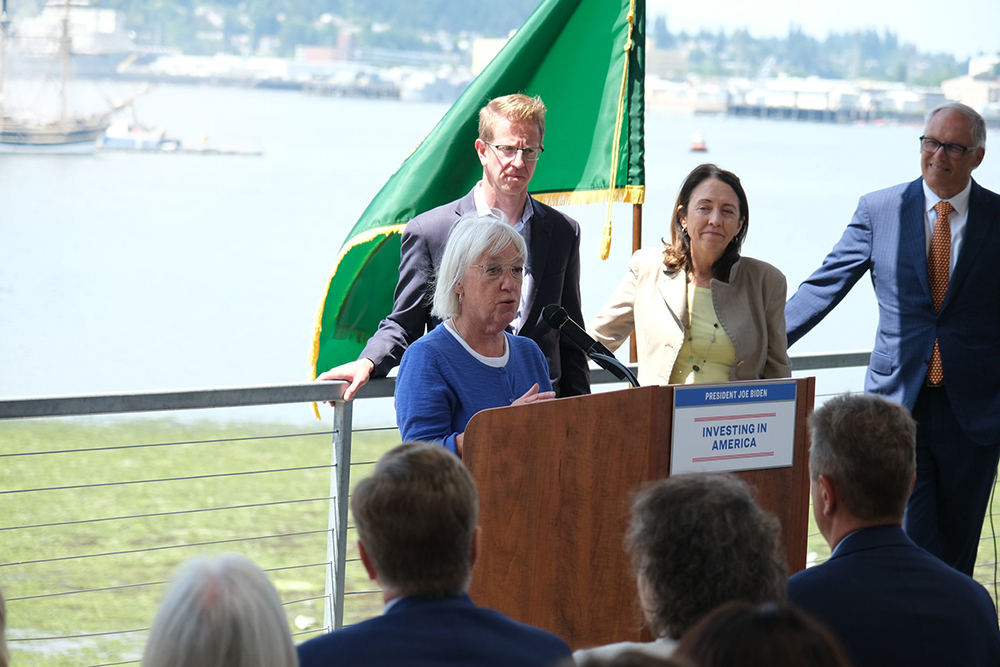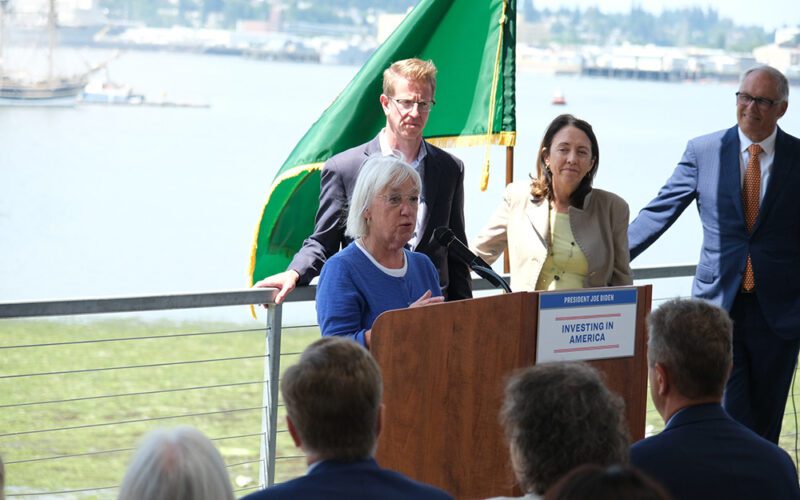
On Nov. 29, U.S. Senators Patty Murray and Maria Cantwell (both D-Wash.) announced that Washington State Ferries (WSF) has received $4.8 million in federal funding to refurbish passenger areas on six aging boats in its ferry fleet.
WSF is the government agency that operates automobile and passenger ferry service in the Washington as part of the State Department of Transportation.
The grant is expected to pay for upgrades on all six of WSF’s Issaquah Class Vessels, originally constructed between 1979 and 1982. Funds came from the Federal Transit Administration’s (FTA) 2023 ferry programs grants. The Washington State Department of Transportation is providing an additional $960,000 for the project.
“Here in Washington state, ferries are really important to our daily lives and commutes—so we need the federal government to make a serious investment in this mode of transportation,” Murray said in a statement. “These critical refurbishments made possible with the funding we’re announcing today will allow these vessels to serve passengers more comfortably and for years to come.”
She also stated that as chair of Senate’s Appropriations Committee, she’s working to secure additional federal resources for the state’s ferries, so that the nation’s largest ferry fleet, which is in Washington state can continue to properly serve communities.
Cantwell added that the state’s ferry system is a critical part of its transportation network and ridership is growing.
“With this money, Washington State Ferries will extend the useful life of six vessels by five to ten years, which will help improve service reliability throughout the ferry system,” she said.
The project is expected to extend the useful life of the vessels and improve passenger amenities, allowing for more space between passengers in high-occupancy areas, and making cleaning easier for WSF staff.
The benefits, according to the senators’ offices, will be primarily felt by the increasing number of walk-on riders in the nation’s largest ferry system. Each of the six ships can carry 90-124 vehicles and 1,200 passengers per trip.
The vessels receiving upgrades, and the years they were built are:
- M/V Issaquah (1979).
- M/V Kittitas (1980): Serving Fauntleroy/Southworth/Vashon
- M/V Kitsap (1980) : Serving Mukilteo/Clinton
- M/V Cathlamet (1981): Serving Fauntleroy/Southworth/Vashon
- M/V Chelan (1981): Serving Anacortes/San Juan Islands
- M/V Sealth (1982)
- In fiscal year 2022, only 43% of the 21 WSF vessels met the target for State of Good Repair, data show. Additionally, a maintenance backlog has resulted in pervasive service disruptions.
From July 2019 to June 2023, each of the six vessels was out of operation in shipyards for an average of 3.12 months each year. Without refurbishment, vessels could continue to deteriorate, and service disruptions will become even more commonplace.
“The project will extend the useful life of these aging vessels—which comprise 28.5% of the entire WSF fleet—for another five to 10 years,” according to a statement issued by the senators.
By the end of 2025, aforementioned six ships are expected to have a combined preservation backlog of over $88 million, with only $28.9 million available for preservation. Due to severe fiscal constraints, preservation funding has been necessarily directed toward only the most urgent needs to keep vessels operational, in the absence of significant funding allocated for passenger amenities.
In January, Murray and Cantwell announced that WSF would receive three grants from the FTA, totaling $11.6 million, including a grant to electrify the Mukilteo-Clinton route. The senators played an instrumental role in securing $25 million to replace the 60-year-old Lummi Island ferry with a state-of-the-art electric hybrid vessel through the Rebuilding American Infrastructure with Sustainability and Equity (RAISE) grant program first established by Murray.
Murray has fought to increase funding for in America’s ferry systems. This year, as Chair of the Senate Appropriations Committee, she secured $20 million for the Passenger Ferry Grant Program—a $5 million increase over last year’s funding level—in the draft Transportation, Housing and Urban Development funding bill for Fiscal Year 2024 that passed the Senate in November.
Cantwell, as Chair of the Senate Committee on Commerce, Science, and Transportation, has championed investments in the State of Washington’s transportation systems and has helped secure federal funding for important infrastructure and transit expansion projects throughout the state.
In August, she announced a $44.6 million grant to help convert three Washington State Ferries to hybrid-electric propulsion systems, along with a $100 million contract with shipbuilder Vigor.

